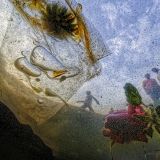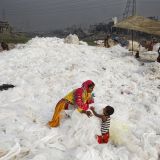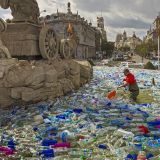Randy Olson
The Plastic Predicament
Arboretum
Plastic, once hailed for its convenience, is now suffocating our planet — and every human is ingesting as much as a credit card of microplastics per week. More than 8.3 billion metric tons of plastic have been produced, with a meagre 9 percent recycled, leaving 6.3 billion metric tons in our land and water graveyards.
The United States is the largest producer of plastic waste, generating 0.75 pounds per person per day. However, in Asian and African countries, where mismanaged plastic waste reaches 80 percent, people are often forced to live on a plastic layer. Eighty percent of the plastic that pollutes our oceans comes from five river systems in the Philippines, Indonesia, and India. Product packaging is the major culprit fuelled by first-world-cracker-plants, which “crack” frack gas atoms into single-use-plastic.
Millions of people in third-world countries are engaged in the informal plastic waste industry, finding work in sorting, cleaning, and processing plastic. China, a major importer of plastic waste, prefers materials from these sites, but its plans to reduce plastic intake creates issues for the planet and these marginalised communities.
When Randy Olson began researching this issue, the magnitude of the problem was not widely known. At that time, the prediction that there will be more plastic than fish in the ocean by 2050 was just hitting our radar. To solve our plastic crisis, a multi-faceted approach is essential. Governments must implement stringent regulations to curb plastic production and encourage sustainable alternatives.
Randy Olson’s 30+ National Geographic projects have taken him to almost every continent. Olson was the Magazine Photographer of the Year in the Pictures of the Year International (POYi) competition and was also awarded POYi’s Newspaper Photographer of the Year. Randy founded The Photo Society (TPS) uniting most of the photographers working for National Geographic. open your eyes feels honoured the be partner of TPS.
Curated by Lois Lammerhuber / Printed by ![]()
Discover here contributions of ETH Zurich to the Sustainable Development Goal (SDG) 6:
Making wastewater history
Oxyle
Dr. Fajer Mushtaq, co-founder of the ETH spin-off Oxyle, wants to make an impact on the most precious resource on earth: water.
Fajer grew up in Kashmir, in North India, one of the few places in the country where water is so clean that one can drink it straight from the tap. When she moved to New Delhi, where she spent most of her teenage years, the childhood connection to natural resources was lost: having access to clean water resources, and even clean air, was no longer guaranteed. She suddenly found herself in a place where water needed to be rationed.
During her PhD studies at ETH Zurich, Fajer experienced how water was used and treated in a research environment. Usually, wastewater is burned at high temperatures and micropollutants are released into the water. These chemicals affect not just the environment near the waste site but also farther afield, sometimes travelling hundreds or thousands of miles away from the source. Once in the environment, some of these chemicals are extremely difficult to remove.
Removing micropollutants from wastewater
Through Oxyle, Fajer and her colleagues have developed a universal treatment for removing micropollutants from water. The technology offers complete removal and real-time monitoring of a wide range of micropollutants in a cost-effective and sustainable manner. Pollutants are eliminated as means of destruction, instead of going through a secondary treatment phase such as filtration, which is a part of the usual water purification cycle.
Oxyle also helps companies become more socially and environmentally responsible. It does this through consultation on how to go beyond the bare minimum of corporate responsibility, empowering them with good technological solutions to go the extra mile.
Changing how water is treated
Oxyle is a team of passionate, bold water entrepreneurs. They believe the water treatment system needs an overhaul, and that every one of us need s to change how we look at water. Guided by the spirit of entrepreneurship they see immense value in treating wastewater efficiently, and turning it into fresh water that can be reused. Wastewater isn’t waste.
“A sustainable future on water will include better engagement with all stakeholders to educate them, enable them and empower them to make the right choices when it comes to how we treat our wastewater, our groundwater and our drinking water.”
Dr. Fajer Mushtaq, Co-founder and CEO of Oxyle
How to manage water
Paolo Burlando
Professor Paolo Burlando became fascinated with water as a young student in Civil Engineering. He understood how vital water is for all human activities – while it’s essential to sustain life on Earth, water also powers agriculture, energy production, industrial activity, and environmental conservation. He also understood how overexploitation and pollution put water resources at risk. Having too much or not enough water can also have dramatic impacts through floods and droughts.
Managing water resources
Paolo’s research explores water in all its forms, particularly surface waters in river basins. Part of that work involves tracing how a drop of rainfall gets transformed into river flow, following its journey as it crosses various layers of land, vegetation and soils. A better understanding of this journey enables scientists to assess how much water is available for a broad range of human uses, and to protect the environment. In turn, this enables societies to plan, design and implement policies and infrastructures that help manage this invaluable resource more sustainably.
Paolo’s more specific objectives are to understand how extreme events such as floods and droughts can be predicted, and how their impact can be mitigated. A trained engineer, he also tackles the question of what it means to ensure water availability for all human and environmental uses, especially in cases of competition over the limited resource.
Better management of water resources means that this precious resource can be better conserved for the benefit of all its users, future generations included. Paolo’s research makes a crucial contribution to adaptation strategies needed to cope with the effects of climate change.
Water and climate are connected
Paolo believes that a sustainable future is one where everyone has learnt to respect natural resources, and societies have changed how they function to reduce overexploitation of those resources. Building on the many brilliant successes we see around the world today, science and technology are ready to support efforts to achieve this goal.
“Although it might sound obvious, it is always important to remind people that water is the most precious good nature has given us. We should preserve it by avoiding any waste and by preventing its pollution. Moreover, we should also be conscious that water and climate are intimately connected, so preventing and mitigating climate change also means preventing and mitigating water related crises.”
Dr. Paolo Burlando, Chair of Hydrology and Water Resources Management at ETH Zürich
open your eyes festival buerau
Botenaustrasse 42
9443 Widnau
Switzerland
Phone: +41 44 218 11 03




